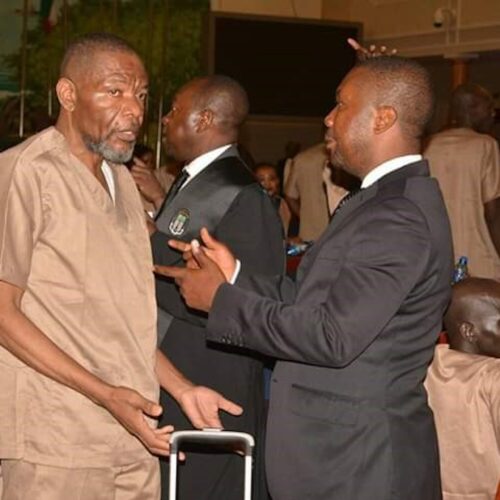Mass Trial in Equatorial Guinea a Farce With no Pretense of Justice
This statement can be attributed to the Clooney Foundation for Justice. For further inquiries, please contact [email protected]

After a 2019 mass trial that involved a litany of human rights violations, 112 people were convicted and given severe sentences, including 58-years in prison for one defendant, for alleged participation in what the authorities have called a coup plot in Equatorial Guinea.
Some defendants in the case were transferred from other countries outside of any legal process, others were tortured – one describes having his arms pulled behind his back until he admitted to knowing people he had never met, and another said the police tortured him by grabbing and pinching his genitals and feet with very large pincers to elicit a confession. Some were put on trial just for being related to alleged coup plotters. Almost all of the 112 are now imprisoned in appalling conditions with no contact with the outside world.
Today, the Clooney Foundation for Justice, EG Justice, and Covington & Burling LLP filed a complaint on behalf of six of the defendants with the UN Working Group on Arbitrary Detention seeking remedies for violations of their rights.
A TrialWatch Fairness Report on the trial, which was monitored by the American Bar Association Center for Human Rights as part of CFJ’s TrialWatch initiative, gave the proceedings a grade of “F” due to violations of nearly every fair trial right. Not only did the court rely on admissions made under torture, but it went so far as to say “this is not a trial about torture” when defendants raised treatment concerns. Monitors in the courtroom also saw a military official enter court and pass messages to the judges, a flagrant violation of the principle of judicial independence. The report, by former UN Special Rapporteur on Torture Juan Mendez and staff at the ABA Center for Human Rights concluded, the “trial failed to meet some of the most fundamental standards of due process recognized by international law.”
In addition to the dire consequences for the individual defendants, the case reveals serious flaws in the Equatoguinean justice system. These include how the courts handle allegations of torture and the lack of independence of the judiciary, which the UN has also previously expressed concerns about. For these reasons, the complaint not only requests relief for the six individual defendants on whose behalf it is brought, but also that the Working Group systematically engage the government of Equatorial Guinea on much-needed reforms.
“Human Rights violations, lack of rule of law and due process are key markers in Equatorial Guinea. The government’s empty promises before the international community create a false sense of investment and interest to change practices in the country. The UN Working Group must act urgently to help redress the victims currently detained,” said Tutu Alicante, Executive Director of EG Justice.
“Lawyers for the six defendants featured in our complaint are no longer able to reach their clients. The harrowing conditions they are likely facing require an immediate response,” added Stephen Townley, Legal Director of CFJ’s TrialWatch Initiative.
Fact box
- The six men endured months of detention without access to lawyers or their families.
- Their sentences range from 21 years and 4 months to 58 years and 10 months.
- Defense lawyers couldn’t speak with their clients until right before trial and weren’t given case information until the trial had begun.
- At least four defendants were tortured including being tied up, beaten, and electrocuted.
- All six were kept in cells without ventilation and had to defecate and urinate in their cells. Waste was only removed once a week.
- Some were questioned in a language they didn’t understand and with no legal counsel present.
- Defense lawyers were arbitrarily subjected to one-to-three-minute limitations on questioning The prosecution was not.
Background
The more-than-100 defendants in this case included people with different personal circumstances. For instance, there were those who happened to be family members of alleged participants in the attempted coup, opposition figures, and those who were rounded up just because they were foreign nationals or migrant workers who the Equatoguinean authorities claimed were in the country “to make war.”
Among the six defendants on whose behalf CFJ, EG Justice and Covington & Burling LLP have filed this complaint, are an opposition political figure; two foreign workers who have denied any knowledge of the alleged coup attempt and said they came to Equatorial Guinea for promised work; and three relatives of alleged participants in the coup who seem to have been arrested because of who their relatives are. What happened to these six defendants is representative of the abuses to which others were also subjected. In addition to the torture described above, another defendant was detained in a cell that was 2m by 2m and had covered windows, and defendants had to urinate and defecate in their own cells, and waste was removed only once a week.
In addition to the mistreatment and fair trial violations to which defendants were subjected, the complaint filed today explains that foreign nationals were subject to particular abuses. Sahil Madi, a Cameroonian national who came to Equatorial Guinea seeking work, speaks only Fulani and was not given interpretation. Others testified that foreign nationals were forced to eat off the floor and denied drinkable water. In addition to arguing that the complainants’ detention is arbitrary due to violations of their rights, the complaint stresses that some defendants were subjected to discrimination, rendering their detention arbitrary on that basis as well.
For additional information on the case, see the TrialWatch Fairness Report.